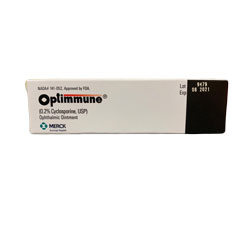Optimmune Eye Ointment
Free Shipping on orders over $75
Low Price Match Guarantee
- 3.5gm Ointment
Description
Optimmune Eye Ointment is a sterile eye ointment containing cyclosporine which helps to treat keratoconjunctivitis Sica (KCS or dry eye) and chronic keratitis (CSK) in dogs. Optimmune Ophthalmic Ointment contains cyclosporine, which has broad anti-inflammatory effects that help to reduce damage to the tear glands while also stimulating tear production. Optimmune Ophthalmic Ointment also reduces eye inflammation.Benefits
- The only FDA-approved veterinary cyclosporine ophthalmic product.
- Achieves therapeutic effect while avoiding systems toxicity.
- Sterile, preservative-free formulation reduces the chance of secondary infection and chemical irritation.
- Shelf life up to 24 months with no refrigeration.
Dosage and Administration
- Remove debris with suitable nonirritating solutions. Apply a 1/4 inch strip of ointment to the affected eye(s) every 12 hours. The ointment may be placed directly on the cornea or into the conjunctival sac.
Caution
US Federal law restricts this drug to use by or on the order of a licensed veterinarian.
Precautions
The clinical effects of Optimmune Ophthalmic Ointment have not been determined in dogs with KCS due to the following conditions: congenital alacrima, sulfonamide usage, canine distemper virus, metabolic disease, surgical removal of the third eyelid gland, and facial nerve paralysis with loss of the palpebral reflex. Some of the underlying conditions which may lead to KCS can be either transient (eg,facial nerve trauma) or correctable with appropriate treatment. Consequently, recovery from clinical signs attributed to KCS may be observed and treatment options may need reconsideration.
When switching to cyclosporine from another therapeutic agent (eg, frequent application of an artificialtear preparation) for KCS or CSK, it should be kept in mind that clinical efficacy is not necessarily apparent immediately after initiation of Optimmune Ophthalmic Ointment therapy. Several days to afew weeks may be required before the clinical effects of Optimmune Ophthalmic Ointment are of sufficient magnitude such that previously initiated therapy can be safely withdrawn. Abrupt cessation of a therapeutic agent immediately upon initiation of Optimmune Ophthalmic Ointment therapy can result in rapid clinical relapse which may be erroneously interpreted as an adverse reaction to Optimmune Ophthalmic Ointment.
The safety of Optimmune Ophthalmic Ointment has not been determined in cases of preexisting viral or fungal ocular infections. It is recommended that in such cases, Optimmune Ophthalmic Ointment therapy be delayed until the fungal/viral ocular infection has been successfully treated.
The safety of Optimmune Ophthalmic Ointment in puppies, pregnant bitches, or dogs used for breeding has not been determined.
Safety
A target animal safety study and clinical field studies with Optimmune Ophthalmic Ointment showed a wide safety margin in adult dogs. In the 6-month target animal safety study, dogs weresubjected twice daily to up to 10 times the approved concentration of Optimmune Ophthalmic Ointment. No apparent toxicity or adverse reactions were observed. Dogs in this study were vaccinated with commercially available vaccines. No effect on antibody titer response was noted. Epiphora was noted in all groups, including the placebo group, and was not associated with any inflammatory change,nor was there any correlation to gross and histopathological changes.
Adverse Reactions
In the KCS clinical field trial, there were 20 adverse reactions reported out of 132 cases enrolled. This corresponds to an adverse reaction rate of 12.9% (13 of 101 cases) for Optimmune Ophthalmic Ointment treated dogs and 22.6% (7 of 31) for placebo treated dogs. The reactions described were primarily ocular and periocular inflammatory reactions. These were likely a function of therapy being unable to fully control the keratoconjunctivitis, rather than a true "adverse reaction." Similarly, in the CSK trial, of 36 cases evaluated for safety, adverse reactions were noted in 2 animals (5.6%). One involved transient hyperemia, epiphora, and mild discomfort of the eye. The other involved periocular/palpebral inflammation and mild alopecia.
On rare occasion, instillation of Optimmune Ophthalmic Ointment may be associated with local irritation as manifested by periocular redness, lid spasm, and excessive rubbing. As the eyes of dogs with KCS often demonstrate considerable inflammation, it will be difficult to determine whether this local irritation constitutes a hyper sensitivity to Optimmune Ophthalmic Ointment. If this ocular irritation persists beyond 7 days, hyper sensitivity to a component of Optimmune Ophthalmic Ointment should be suspected and therapeutic options reassessed.
Storage
Store between 2° and 25° C (36° and 77° F).
| RX required for this item. Click here for our full Prescription Policy and Form |
-
The only FDA-approved veterinary cyclosporine ophthalmic product.
-
Achieves therapeutic effect while avoiding systems toxicity.
-
Sterile, preservative-free formulation reduces the chance of secondary infection and chemical irritation.
- Shelf life up to 24 months with no refrigeration.
DESCRIPTION:
Each gram of OPTIMMUNE Ophthalmic Ointment contains 2 mg of cyclosporine, USP; petrolatum, USP; corn oil, NF; and Amerchol® CAB base. Cyclosporine (cyclosporin A), the active ingredient of OPTIMMUNE Ophthalmic Ointment, is a cyclic undecapeptide metabolite of the fungus Tolypocladium inflatum gams.
DOSAGE AND ADMINISTRATION:
- Remove debris with suitable nonirritating solutions. Apply a 1/4 inch strip of ointment to the affected eye(s) every 12 hours. The ointment may be placed directly on the cornea or into the conjunctival sac.
- It is recommended that dogs exhibiting chronic recurring conjunctivitis be tested for adequate tear production to determine if they are suffering from early stages of chronic KCS.
- For best results in treating KCS, cyclosporine ophthalmic ointment should be administered early in the course of the disease before irreversible damage to the lacrimal tissue, or dense corneal scarring or pigmentation occurs.
- Dogs afflicted with KCS or CSK will most likely require lifelong consistent therapy (see EFFICACY section). For CSK, because environmental factors such as ultraviolet (UV) radiation are implicated in the pathogenesis, clinical signs may subside in the winter months when light intensity is reduced or if the dog is moved to a lower altitude, or indoors, and thus exposed to less UV radiation.1
- In cases refractory to cyclosporine, the diagnosis should be re-evaluated and a different course of therapy considered. Periodic reassessment of the need for OPTIMMUNE Ophthalmic Ointment therapy is recommended.







